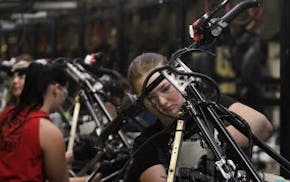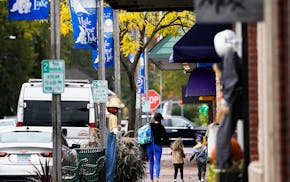WASHINGTON – Members of the public, says Sen. Amy Klobuchar, would sometimes mistake her for the wife of Sen. Al Franken.
For Klobuchar, the faux pas became fodder for the occasional speech — a reliable laugh line. But it won't be an issue anymore when Lt. Gov. Tina Smith replaces Franken in early January, making Minnesota only the fourth state nationwide at this time to be represented by two women in the U.S. Senate.
Smith will also become the 22nd woman in the 100-member Senate, a new high.
"This is huge," said Emily Cain, executive director of EMILY's List, a Washington, D.C.-based group that works to elect women candidates who support legal abortion. "It's huge for Minnesota, the United States Senate and our country."
For many DFLers, it's a milestone that's also bittersweet given the circumstances around Franken's departure. He will officially leave office on Jan. 2, after bowing to demands he do so by a large group of fellow Democratic senators after a series of allegations by women who said Franken touched or kissed them against their wishes.
Klobuchar is still the only woman who Minnesotans have elected to the U.S. Senate. Muriel Humphrey was appointed to the Senate in 1978 to finish the term of her husband, Hubert Humphrey, after he died; she served just over nine months.
When Smith takes office, Minnesota will join California, Washington and New Hampshire as the only states with two women as its U.S. Senate delegation. Maine previously had two women senators from 1997 to 2013, as did Kansas for a brief period in 1996.
With Smith as the 22nd female senator, the group will comprise 15 Democrats and seven Republicans. The numbers are inching up at a time when the interest by women in running for political office seems to be growing.
"Women have been waiting a long time to have some equality in the political arena, and we still don't have it," said Joan Growe, who served as Minnesota's secretary of state from 1975 to 1999. "I don't expect we will have it in my lifetime, but we keep pushing little by little."
Since President Donald Trump's election, Cain said, EMILY's List has fielded calls from more than 24,000 women interested in running for office in the next decade. During the previous election cycle, the organization got just 920.
"It's important because role models matter, and younger generations need to see more female representatives in positions of power, particularly when it comes to government," Cain said.
It was in 1992 that California became the first state to send two women to the Senate — Democrats Dianne Feinstein and Barbara Boxer. That election year was dubbed the "Year of the Woman" after a wave of female candidates won elections following the nationally televised Supreme Court confirmation hearings for Clarence Thomas, who had been accused of sexual harassment.
Whatever their personal and policy differences, women in the Senate are known for building alliances on issues to circumvent the normal political gridlock.
In a statement, Klobuchar praised female senators, saying they "are some of the most effective legislators I know, and that's because we find ways to work together and are focused on getting results."
It was also female Democratic senators who led the calls for Franken to resign. Sen. Kirsten Gillibrand of New York was first to do so, followed quickly by half a dozen other female senators before men in the Senate Democratic caucus started joining in.
Smith's appointment to replace Franken runs through next November, when a special election will be held to choose someone to serve the final two years of his term, through 2020. The first candidate to join the special election race on the Republican side was also a woman, state Sen. Karin Housley of St. Marys Point.
"You might be asking yourself: 'Why would anyone want to go to Washington, D.C., right now and be part of that dysfunction they call Congress?' " Housley said in a YouTube video announcing her candidacy. "Actually, I can't think of any place in this country more in need of someone like me right now."
If the special election field ends up as Smith vs. Housley, that would become the most high-profile political race between two women in Minnesota's history.
"It really is time to realize the full value of women's leadership, and women and men leading side by side in relatively equal numbers is what we need to solve complex problems," said Liz Johnson of Duluth, a co-founder and board member of VoteRunLead, a national group that works to accelerate the number of women in political leadership.
"We can't leave it up to one gender."

Minnesota added thousands of jobs in March but worker shortage still an issue
Private prison van driver, accused of raping St. Paul woman he was transporting, gets 30 years for similar attacks

Shop the curbs for free on 'Trash to Treasure Day' in White Bear Lake
Longtime Uptown boutique closing in May

